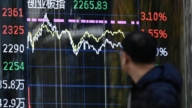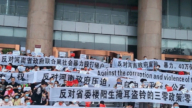【新唐人2012年6月6日訊】據大陸媒體報導,除了廣東省公安廳長不再兼任政法委書記,還有21地市政法委書記不再兼任公安局長。中共喉舌《新華網》6月4號原文轉載這則報導。分析認為,《新華網》支持廣東削藩,說明原本被稱為「第二中央」的政法委,大勢已去,周永康已成昨日黃花。請看報導。
政法委權力的削弱和級別的降低,在前段時間已經有所傳聞。近來,一向敢言開明的廣東「南方」報業旗下的《南方都市報》報導說,政法委書記原本兼任公安局長,在換屆之後不再兼任。而隨著廣州、深圳、東莞、梅州陸續作出調整,目前,21地市政法委書記都不再兼任公安局長,改由一名政府副市長兼任。
據了解,中共中央政法委在1998年前,並不是一個很引人注目的機構,在江澤民鎮壓法輪功之後,政法委權力急劇膨脹,被打造成了「第二中央」。
時事評論員張粟田分析認為,從江澤民執政起,為了更有利的貫徹中央政法委對民眾打壓迫害的政策,在地方上逐步推行由公安局長兼任政法委書記,這樣就使公安局長權力最大化。
張粟田:「這樣造成的惡果就是,各地公安系統亂權,法院、檢察院成了花瓶擺設,實際要聽令於公安局長,就造成中國司法的混亂,使百姓遭受更多的無妄之災,百姓怨聲載道,這就加重了中共的執政危機。」
另據《南都》記者統計,自去年年底換屆以來,共有佛山、東莞等14地市對政法委書記一職作出調整。沒有更換政法委書記的地市,也普遍出現工作上的變動。而中共黨媒《新華網》原文轉載了《南方都市報》的報導。
時事評論員張粟田認為,《新華網》這次也作了報導,更能看出胡溫在背後操作。而且有消息說,中央政法委,不再進入政治局常委。
張粟田:「因為此前王立軍事件爆發之後,就爆出了薄熙來和政法委書記周永康串通,要密謀造反,要搞掉習近平這麼一個計劃,所以政法委也直接威脅到中共自身的執政安全。那麼從這個現象上看,原本被稱為第二權力中央的政法委,它大勢已去,周永康已成昨日黃花。」
多年來,周永康掌控政法委,持續擴大暴力維穩。早前,「北京天則經濟研究所」榮譽理事長茅於軾、「社科院社會問題研究中心」主任於建嶸、「北大」法學院教授賀衛方、「東南大學」法學院教授張讚寧等學者,紛紛呼籲「取消政法委」。
獨立評論員洪劍認為,政法委不能直接指揮公安,就切斷、消弱了政法委的實權。
獨立評論員洪劍:「這也說明胡溫對血債派的一種試探。切斷政法委與公安的聯繫,也是拿下週永康一個關鍵的步驟。」
網絡作家吳建國認為,政法委的權力,已威脅了中央和各級黨委核心人物。
網絡作家吳建國:「胡溫削弱政法委的權力,其中一個原因,還是他們看到政法委實權過大,不僅導致腐敗,而且威脅了中央和各級黨委核心人物。同時也說明胡溫有能力削弱政法委的權力,而政法委的頭頭周永康,作為江澤民的血債派代表,已經失勢,沒有能力維持政法委的特權。」
不過,吳建國指出,削弱政法委權力並非意味著中共會走向司法獨立。他說,如果胡溫有誠意實現司法獨立,那就應該徹底取消政法委,讓執法部門依法行事,而不是依「黨的指示」行事。
採訪編輯/常春 後製/薛莉
“Second Power Center” Come to an End:
Xinhua Supports Guangdong to Weaken PLC.
According to Chinese media, the Director of Public Security
in Guangdong Province will not serve as the Secretary
of the Political and Legislative Committee (PLC).
This has happened in another 21 cities.
Xinhua Net, the Chinese Communist Party’s (CCP)
official media, cited the report on June 4.
From the evidence Xinhua Net supports weakening
the PLC, analysts believe that
“the second power center” and Zhou Yongkang’s time
have come to end. Here is more information.
There have recently been rumors about the suppression
and degradation of the PLC.
According to Southern Metropolitan Daily,
owned by Southern Daily Group in Guangdong,
PLC secretaries will not serve as public security
bureau directors after re-election.
Cities like Guangzhou, Shenzhen, Dongguan,
and Meizhou have made this change one by one.
In 21 cities, deputy mayors will take the place of PLC
secretaries, serving as public security bureau directors.
Before 1998, the central PLC wasn’t
an important organization.
However, after Jiang Zemin started persecuting Falun Gong,
the PLC expanded its power drastically. It became “the second power center.”
Zhang Sutian, current affairs commentator, said that after
Jiang Zemin took power, and in order to carry out
the persecution, many public security bureau directors
became PLC secretaries, maximizing their power.
Zhang Sutian: “As a result, many local public security
bureaus abuse their power.
Courts and procuratorate actually have no power
and have to obey public security bureau directors.
The consequent chaos in China’s justice system
has made people suffer.
Complaints can be heard everywhere,
which increases the CCP’s crisis.”
According to statistics by Southern Metropolitan Daily
reporters, since the reelection at the end of last year,
14 local areas such as Foshan and Dongguan
changed PLC secretaries.
In some other areas, changes have been made
to the responsibilities that PLC secretaries hold.
Official media Xinhua Net, published the whole article
from Southern Metropolitan Daily.
Zhang Sutian, current affairs commentator,
said that Xinhua Net had related reports this time.
These were more obviously manipulated
by Hu Jintao and Wen Jiabao.
Other sources reveal that the Central PLC will no longer
enter the Central Politburo Standing Committee.
Zhang Sutian: “After Wang Lijun’s case and the conspiracy
between Bo Xilai and Zhou Yongkang to oust Xi Jinping was exposed,
the security of the CCP itself got threatened
by the PLC.
According to latest information, the PLC,
as the second power center, as well as the power of Zhou Yongkang, has come to an end.”
The PLC, under the control of Zhou Yongkang has for many
years has expanded it’s violence to maintain stabilization.
People have called on the central government
“to get rid of PLC.”
This includes Mao Yushi, Chairman of Beijing Tianze
Economics Institute and Yu Jianrong, sociologist at the Chinese Academy of Social Sciences.
It also includes He Weifang, law professor
at Peking University and Zhang Zanning, law professor at Southeast University.
According to commentator Hong Jian,
if the PLC cannot directly lead public security bureaus, its main power is actually deprived.
Hong Jian: “This indicates Hu and Wen’s test
on the blood-debt faction.
To cut the connection between the PLC
and the public security bureau, their key step is removing Zhou Yongkang.”
Writer Wu Jianguo believes that the power of the PLC
has threatened the security of the CCP’s core members.
Wu Jianguo: “Hu and Wen weakened the PLC’s power.
One of the reasons is that they were aware
of the PLC’s expanded power.
It has not only led to corruption, but threatened
the key leaderships at different levels.
Meanwhile, it shows Hu and Wen’s
capability of suppressing the PLC.
Zhou Yongkang, as the head of the PLC,
and part of Jiang Zemin’s blood-debt faction, has lost his power.
He can no longer maintain the PLC privileges.”
But Wu Jianguo pointed out that suppressing
the PLC doesn’t mean the CCP will then step into judicial independence.
If Hu and Wen have the inclination,
they should completely remove the PLC.
They should let law-enforcement authorities operate
based on law, rather than under the “CCP’s command.”





























